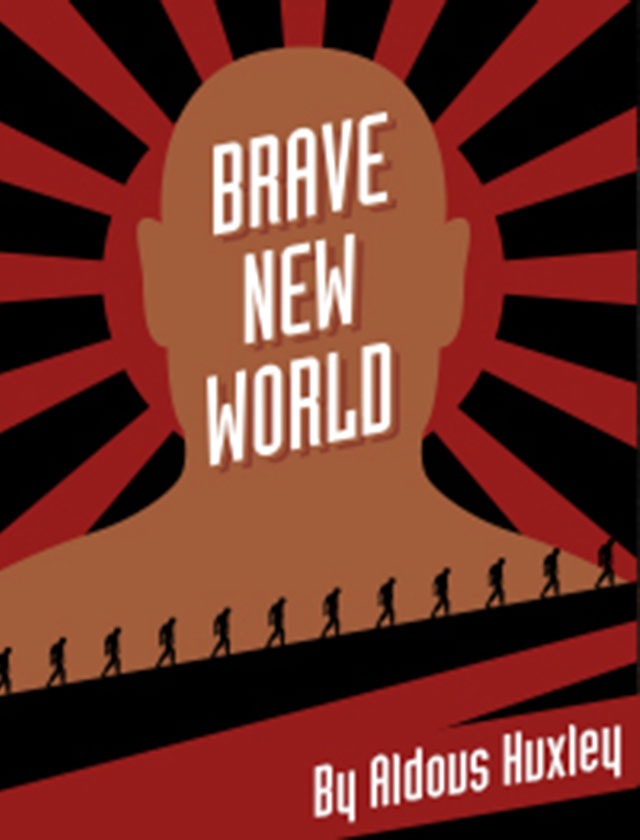Brave New World
by Aldous Huxley
Aldous Huxley
Aldous Leonard Huxley was born in Surrey, England, in 1894 into an intellectually distinguished family. His grandfather, Thomas Huxley, was a biologist famously nicknamed “Darwin’s Bulldog” for his support of Charles Darwin’s theories about evolution. Both of Huxley’s parents were teachers and his mother, Julia Arnold, was a niece of the significant 19th-century writer Matthew Arnold. Raised in a prominent family of intellectuals, scientists and teachers, Huxley’s education was wide-ranging. Throughout his career as a novelist, poet, essayist and social satirist, Huxley was always interested in the intersections of art and science, which can be clearly seen in the dystopian future described in his 1932 novel Brave New World.
Huxley’s education at Eton and Oxford were typical for a privileged son of the British upper class. Initially, he wanted to pursue a career in medicine, but near-blindness brought on by an eye disease contracted when he was 16 made this impossible. He read avidly with the aid of a magnifying glass and distinguished himself at Oxford by taking a First in English Literature.
An important part of Huxley’s education, informally, was his inclusion in the artistic and literary circle surrounding Lady Ottoline Morrell. There he met many of England’s foremost literary experimenters and political reformers, including the novelist Virginia Woolf and the economist John Maynard Keynes. There is no doubt that Huxley’s exposure at a young age to this group of progressive artists and thinkers influenced the non-traditional world view expressed in his writing.
When Huxley graduated from Oxford in 1916, he took a teaching job at Eton. One of his students was the young Eric Blair, who would later write the dystopian classic 1984 under the pen name of George Orwell. Huxley also worked as an editor for one of the most famous publications of the time, the journal Athenaeum, and contributed regularly to Vogue and Vanity Fair. He published his first collection of poetry, The Burning Wheel, in 1916 and his work was praised by Marcel Proust. Although it seemed he was destined to gain fame as a poet, Huxley quickly followed this success with two novels—Crome Yellow (1921) and Antic Hay (1923)—which began to set him apart as a gifted satirist of the modern privileged class.
In 1928, Huxley published Point Counter Point, which took his satire to a more philosophical level in its biting examination of commonly held but little questioned social values. Increasingly, Huxley’s novels called for profound ethical examinations on the part of the reader, exploring the relationship of the individual to society. Brave New World (1932), his most enduring work, represents this theme at its height. In this imagined future, the very concepts of individuality and individual choice are all but forgotten, having been exchanged for a mechanized world in which stability reigns supreme.
In many ways, Brave New World represents a new direction for Huxley as a novelist. Even as it includes his usual devices of humor and absurdity, it also introduces a level of evil and violence that begs the reader to take its questions seriously. By setting the novel 600 years in the future, Huxley envisions the potential consequences of the relationship between technology and social control, clearly warning...
Sign up to continue reading >
